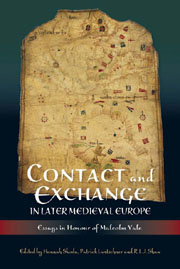Book contents
- Frontmatter
- Contents
- List of Illustrations
- List of Contributors
- Acknowledgements
- The Work of Malcolm Vale
- Principal Bibliography of Malcolm Vale
- Introduction
- Part I Boundaries and Units
- Introduction
- Economic Development, Social Space and Political Power in Bruges, c. 1127–1302
- Flemings in the Peasants' Revolt, 1381
- Does a Common Language Mean a Shared Allegiance? Language, Identity, Geography and their Links with Polities: The Cases of Gascony and Brittany
- Revisiting the Political Uses of Vernacular Language in Portugal during the Thirteenth Century: On Models, Motives and Modes
- Scotland in the Later Middle Ages: A Province or a Foreign Kingdom for the English?
- The Angevin Legacy, Dynastic Rivalry and the Aftermath of the Hundred Years War, 1453–1491
- Part II Practices of Exchange
- Conclusions
- Index
- Tabula Gratulatoria
Does a Common Language Mean a Shared Allegiance? Language, Identity, Geography and their Links with Polities: The Cases of Gascony and Brittany
from Part I - Boundaries and Units
Published online by Cambridge University Press: 05 February 2013
- Frontmatter
- Contents
- List of Illustrations
- List of Contributors
- Acknowledgements
- The Work of Malcolm Vale
- Principal Bibliography of Malcolm Vale
- Introduction
- Part I Boundaries and Units
- Introduction
- Economic Development, Social Space and Political Power in Bruges, c. 1127–1302
- Flemings in the Peasants' Revolt, 1381
- Does a Common Language Mean a Shared Allegiance? Language, Identity, Geography and their Links with Polities: The Cases of Gascony and Brittany
- Revisiting the Political Uses of Vernacular Language in Portugal during the Thirteenth Century: On Models, Motives and Modes
- Scotland in the Later Middle Ages: A Province or a Foreign Kingdom for the English?
- The Angevin Legacy, Dynastic Rivalry and the Aftermath of the Hundred Years War, 1453–1491
- Part II Practices of Exchange
- Conclusions
- Index
- Tabula Gratulatoria
Summary
Since the nineteenth century, the use of a single language has tended to be associated with a single political entity. Just as those attempting to create or strengthen so-called ‘nation-states’ in Western Europe have often pressed for linguistic homogeneity in their territories, historians have tended to believe that the use of a single language also has direct links with belonging to a single specific political entity using this language, and that, at the very least, some sort of solidarity exists between speakers of the same language living in different states. Not all modern voices have concurred regarding the necessity of linguistic unity for political unity: Ernest Renan, in his famous Sorbonne talk in 1882 What is a Nation?, drew a distinction between the German nation as essentially created around German language and culture, and the French nation which was constituted by a common will emerging from a common history, ‘a daily plebiscite’ according to him. However, the Third Republic promoted and imposed French as the only language admitted in the public sphere, with the aim of achieving the same degree of linguistic unity as in Germany. In this context a language was deemed to correspond to a political unit and vice versa, but did this notion also exist in the Middle Ages? Thomas Polton, Henry V's ambassador at the Council of Constance, asserted in May 1417 that a ‘nation is understood as a people, distinct from another by blood relationship and association or by difference of language, which is the chief and surest proof to be a nation’.
- Type
- Chapter
- Information
- Contact and Exchange in Later Medieval EuropeEssays in Honour of Malcolm Vale, pp. 79 - 102Publisher: Boydell & BrewerPrint publication year: 2012



